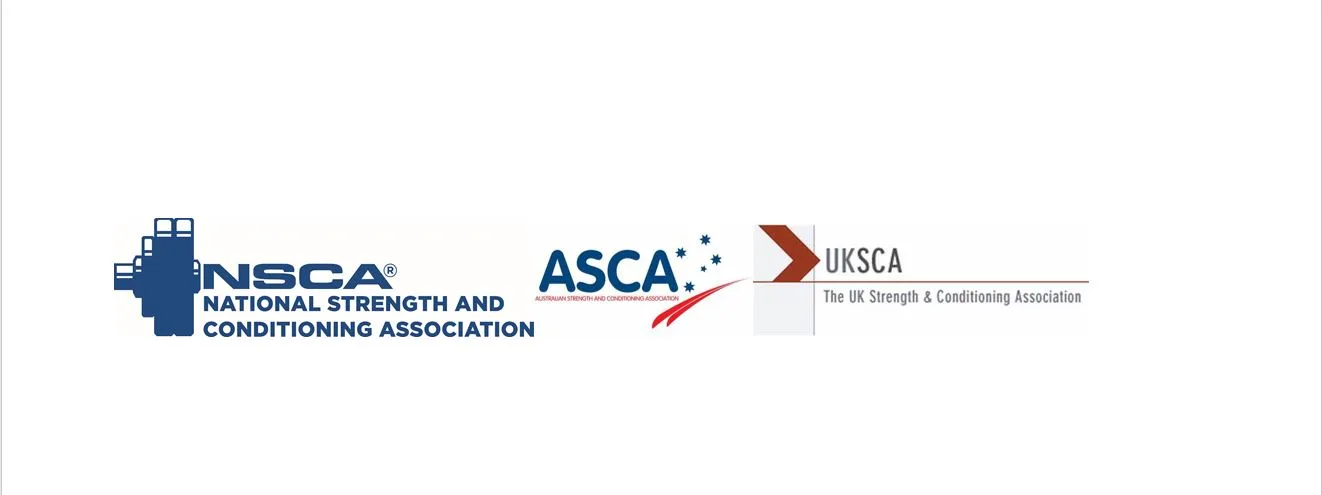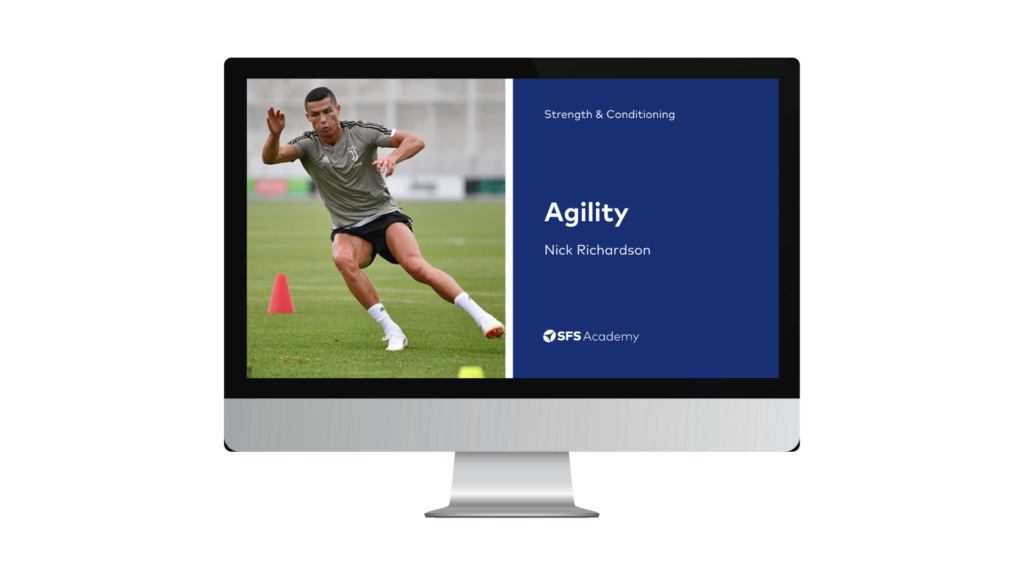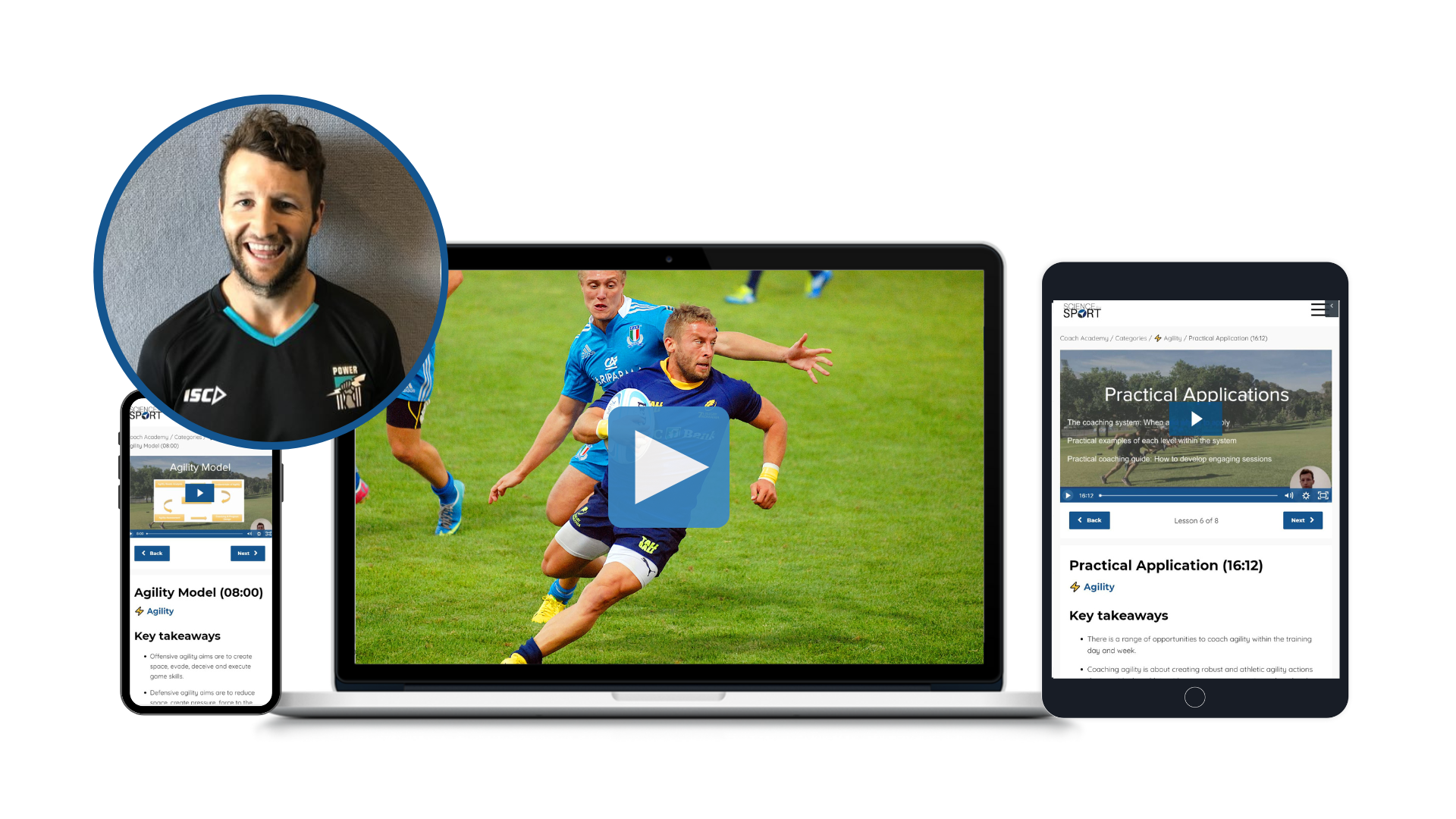Contents
- Introduction
- National Strength and Conditioning Association (NSCA)
- United Kingdom Strength and Conditioning Association (UKSCA)
- The Australian Strength and Conditioning Association (ASCA)
- Which Accreditation is Best?
- Which S&C accreditation is best for coaches outside of the USA, UK, and Australia?
- References
- About Author
Introduction
Many strength and conditioning (S&C) job descriptions mention the requirement for accreditation. Often job descriptions have the following phrase: ‘must have a relevant S&C accreditation’ or ‘must have the following X accreditation’. But what are accreditations? Basically, they are qualifications used to improve existing S&C knowledge. Most jobs will require at least one major S&C accreditation, or they might even require a specific one.
Aspiring S&C coaches often don’t know enough about these accreditations and the potential time and cost associated with them. This blog will focus on three major S&C organisations which offer relevant accreditations – the NSCA, UKSCA, and the ASCA.

The National Strength and Conditioning Association (NSCA)
The National Strength and Conditioning Association (NSCA) (2) is the USA’s professional body for strength and conditioning. The NSCA offers the Certified Strength and Conditioning Specialist (CSCS) accreditation, a programme created in 1985.
Successful CSCS candidates should demonstrate knowledge and skills to design and implement effective S&C programmes that improve athletic performance. Candidates can only take the exam if they have a bachelor’s degree or higher in a field like S&C or Exercise Science. Candidates must also have up-to-date certificates in first aid, Cardiopulmonary Resuscitation (CPR), and Automated External Defibrillator (AED).
The CSCS consists of two sections (outlined below) that test the candidate’s knowledge of scientific foundations and practical applications. Both sections require the candidate to score a scaled score of 70. For more information on the scoring process please refer to the NSCA certification handbook (3). The first-time pass rate for both sections was 57 % in 2021 – almost half of all applicants failed, showcasing just why this accreditation is looked upon so favourably by employers.
The test is available in numerous languages and there are test centres worldwide. Candidates do the test on a computer in a testing room. When it comes to studying for the test, the NSCA Essentials of Strength and Conditioning 4th Edition is a must-have, while the Movement System CSCS prep course is also very beneficial and highly recommended as extra study material.
Scientific Foundations
This section consists of 80 scored and 15 non-scored multiple-choice questions; there is a 90-minute limit for this section. It isn’t known which questions are scored, so every question should be treated the same. Forty-four questions are based on exercise science, 19 are based on sports psychology, and 17 are based on sports nutrition.
Practical Application
This section consists of 110 scored and 15 non-scored multiple-choice questions. There is a two-and-a-half-hour time limit for this section. Approximately 40 of these questions are video/image-based questions. Forty questions are based on exercise technique, 38 are based on programme design, 20 are based on testing and evaluation, and 12 are based on organisation and administration.
What is the cost and recertification of the NSCA CSCS?
It costs $340 USD for members of the NSCA and $475 for non-NSCA members to take the CSCS exam. If a section is failed, the cost for retaking that section is $250 for members and $385 for non-members. Retakes must be taken within 90 days of the initial test date.
The CSCS accreditation lasts for three years. To maintain the certification, there are two choices: Retake and pass the CSCS exam again or complete and report the desired amount of continuing education units (CEU). It is worth noting payment for the full cost of the exam is required again and if the appropriate amount of CEUs is attained, the recertification fee will have to be paid.
CEUs are awarded for multiple activities such as attending live S&C events, engaging in relevant continuous education, sharing your expertise through presentations and publications, and completing NSCA quizzes and assessments. A more detailed description of CEUs can be found in the NSCA certification handbook.
An overview of the NSCA CSCS accreditation
The CSCS accreditation is heavily respected worldwide. To pass the exam, candidates must display a strong knowledge of the theory that underpins S&C. However, the absence of a practical coaching exam cannot be ignored. Coaching ability is massively important in S&C, and this is not assessed in the CSCS. Just because the candidate may be able to answer questions based on watching videos on a computer, doesn’t translate to being an excellent coach. The cost associated with the exam and study material is something to be aware of. Many CEU opportunities have a cost attached to them, meaning the recertification process has a cost involved as well.
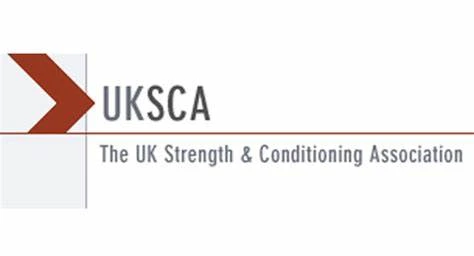
United Kingdom Strength and Conditioning Association (UKSCA)
The United Kingdom Strength and Conditioning Association (UKSCA) (3) is the professional body for strength and conditioning in the UK. The UKSCA offers the Accredited Strength and Conditioning Coach (ASCC) accreditation. The ASCC tests the coach’s applied knowledge and practical coaching skills.
The ASCC exam process consists of four sections. For the first section of the assessment, the coach must present a case study either in person or through a video call to a UKSCA assessor. The remainder of the assessment requires you to attend a UKSCA assessment location, with three assessments taking place on this day: A multiple-choice written exam, a weightlifting practical assessment, and a plyometric and speed/agility practical assessment.
Case study
The case study should outline a previous S&C programme delivered to an athlete. The case study is a 10-minute presentation followed by 10 minutes of questioning. It should include the following: a needs analysis of the sport and athlete, programme rationale, programme design, examples of a training session, and methods used to monitor and evaluate the athlete during the programme.
Multiple choice exam
The multiple-choice written exam contains 50 questions to answer within 60 minutes. The questions are based on human anatomy and movement, physiological responses to training, and the principles of training and adaptation. The pass rate for the multiple-choice exam is 65 %. Only 50 % of first-time candidates pass both the case study and multiple-choice exam.
Weightlifting practical assessment
This assessment examines the candidate’s ability to teach the key coaching points and demonstrate the exercise lifts to a reasonable level. It is broken into two 10-minute sections. Firstly, there is an assessment on the back squat, followed by either the clean and jerk or the snatch exercise. Candidates are required to warm up for the lift, verbally detail the technical components of the lift, and perform demonstrations of the full lift which match the verbal details given.
Plyometric and speed/agility practical assessment
The final part of the assessment is the plyometric and speed/agility section. The candidate is required to give a 20-minute coaching session to another candidate and then swap over and become the athlete for the candidate. When you are the ‘athlete’, your athletic skills are not being assessed. For this section, you will be given one plyometric exercise and one speed/agility exercise. There are two minutes to plan and set up your session. The session should consist of a dynamic warm-up to prepare the athlete for the specific exercises, followed by an assessment of the athlete performing the exercises. The candidate is expected to teach and enhance the athlete’s movements through appropriate regressions and progressions of the given exercises. Only 25 % of first-time candidates pass the weightlifting and plyometric, and speed/agility practical sections. The UKSCA offers regular practical workshops for those looking for prior experience before their exam.
What is the cost and recertification of the UKSCA ASCC?
It costs £300 for the assessment process. Unsuccessful candidates are charged £75 per unsuccessful section upon re-assessment. Successful candidates who receive the ASCC accreditation are required to follow the UKSCA continuous professional development model. This model requires ASCC holders to attain 100 credit points over two years, which are awarded through a variety of activities such as working as an S&C coach, lecturing, attending conferences, writing articles, speaking at events, etc. Failure to submit credit points can result in financial penalties and potential loss of the ASCC accreditation.
An overview of the UKSCA ASCC accreditation
The ASCC requires knowledge of S&C theory and practical coaching ability and application. The inclusion of the practical assessments makes it resemble real-life coaching more than the NSCA CSCS. However, the very low success rate highlights its difficulty. This suggests the testing criteria particularly for the practical assessments may be too strict and too rigid. It certainly holds a lot of weight in the UK, but it probably doesn’t have the same respect as the NSCA CSCS worldwide.
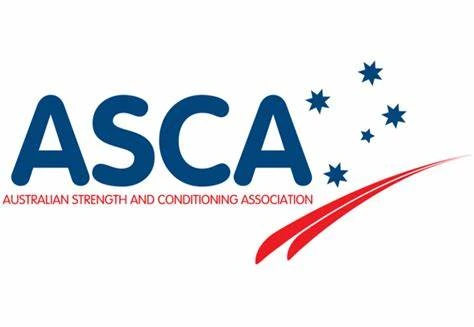
The Australian Strength and Conditioning Association (ASCA)
The Australian Strength and Conditioning Association (ASCA) (4) accreditation is the leading certificate for S&C coaches in Australia. It is recognised by the Australian Institute of Sport and the Australian Sports Commission. The ASCA works on a tiered basis with different levels reflecting the quality level of the S&C coach.
Introductory level S&C coach
This level is for sports support teachers and secondary school students with an interest in S&C. This level provides a basic understanding and application of S&C. Candidates can enrol in the course once they are 15 and it requires six hours of face-to-face contact, or it can be done self-paced online. Candidates must pass an online assessment at the end of the course within six months of commencement.
Level one
Level one provides a primary level of understanding and application of S&C for club to state-level athletes. Candidates must be 18 to attend this course and attend a two-day course, or it can be completed online. A level one ASCA coach can practice in a volunteer or paid role as an S&C coach within sporting clubs and high schools.
Associate and professional level two
The associate level two is for S&C coaches who wish to practice in a paid role with semi-professional or professional sporting clubs. A level two S&C coach should be able to plan and deliver advanced S&C for athletes at state or national level. To attain a level two accreditation, candidates must enrol in a four-day face-to-face course and have the following prerequisites: a current level one accreditation with a minimum of 100 hours of S&C coaching at state level. Candidates may also be considered if they have completed at least two years of a sports science or S&C degree. Once two years are spent at associate level two, the candidate can upgrade to a professional level two S&C coach.
Elite and master level three
The first step of level three is the elite level three S&C coach. A four-day face-to-face course with pre, mid, and post-course assessments is mandatory. But before you can attend the course, the following prerequisites are required; a minimum of two years spent as a professional level two S&C coach, completion of a relevant undergraduate degree, a minimum of six years of full-time S&C employment, contributions to the ASCA through publications or presentations, and evidence of training athletes at a national or professional level.
Once this level of accreditation is received, the candidate can practice in a full-time paid position with professional, national, and international organisations. For the highly motivated and ambitious Australian S&C coaches, there is one final stage at level three. A master level three S&C coach. To attain this level of accreditation, the candidate must have previously been an elite level three S&C coach, delivered a major presentation at an ASCA National Conference, coached multiple medal potential athletes across different sports, and made a significant contribution to S&C in a practical and educational setting.
What is the cost and recertification for ASCA S&C Level 1 and 2?
The cost for level one is $475 AUD. The cost for associate level two is $1,100. ASCA accreditation expires after two years unless sufficient reaccreditation activities such as workshops, conferences, and courses are achieved.
An overview of the ASCA accreditations
The ASCA recognises and awards the importance of S&C from school and recreational level all the way to the top elite level of sport. Although the ASCA accreditation courses are available in many countries, they are significantly more valued in Australia than in other countries. For reference, it is often suggested the NSCA CSCS and the UKSCA ASCC are the equivalents of the ASCA level two. Meaning, if you’d like a deeper and more advanced understanding of S&C, then the ASCA’s Elite and master level three accreditation could be the right fit for you.
Which S&C accreditation is best?
It depends! The job description may determine what exact accreditation is desired, but it may just mention ‘a relevant’ or ‘major’ S&C accreditation. In this case, any of the mentioned accreditations should suffice.
The locality is going to influence your accreditation choice too. For S&C jobs in the USA, the NSCA CSCS is recommended. The UKSCA ASCC is recommended for those looking for S&C employment in the UK and the ASCA is recommended for S&C job opportunities in Australia.
Which S&C accreditation is best for coaches outside of the USA, UK, and Australia?
The NSCA CSCS is the most internationally accessible. The exam can be taken at any authorised testing centre in the world. The exam is also available in the following languages: Italian, Spanish, Chinese, Japanese, and Korean.
If a career in S&C still sounds appealing, then read our article on what S&C coaches do and how to get into the industry.
- Become a Certified Strength & Conditioning Specialist, NSCA. Available at: https://www.nsca.com/certification/cscs/
- The UK’s professional body for strength and conditioning (no date) UKSCA. Available at: https://www.uksca.org.uk/home
- Coach accreditation + education, Australian Strength and Conditioning Association. Available at: https://www.strengthandconditioning.org/courses-accreditation
